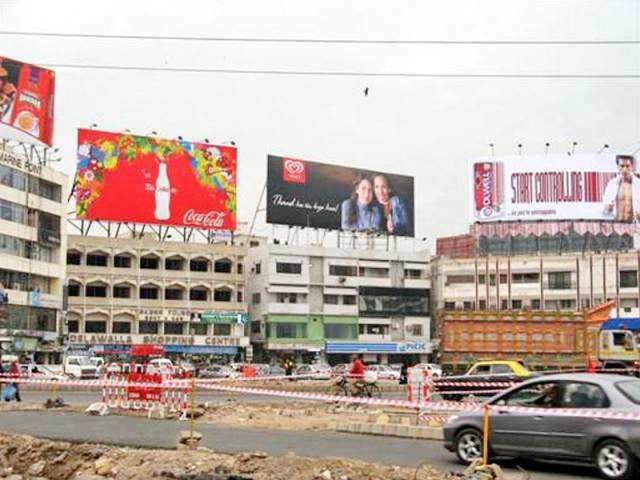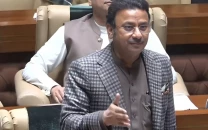Karachi's billboard advertisement industry collapses after SC ruling
Ban on billboards on public property resulted in open skies and empty wallets

The ban on billboards on public hoardings in Karachi led to the collapse of the billboard advertisement industry. PHOTO: EXPRESS
Five months later, the Supreme Court's (SC) blanket ban on all outdoor advertisements on public property and private advertisements encroaching on public property in the metropolis bankrupted Aslam. He died of a heart attack in August.
"This is just a glimpse into the other side of the story, contrary to what the media has been showing following the ban on the billboards in the city," says Outdoor Advertising Association President Rahat Muhammad Ali. Thousands of people associated with the business are now living hand to mouth.
Take down illegal billboards in three days: Supreme Court tells DHA, cantonment boards
How it started
On December 13, 2012, the Sindh High Court allowed a petition filed by four outdoor advertising agencies against the imposition of an advertisement tax by the Cantonment Board Karachi (CBK) in violation of the mandatory legal provisions.
According to advertising agencies, the CBK had imposed enhanced tax on signboards on public hoardings installed by them within its territorial jurisdictions without fulfilling the legal formalities.
Later, a two-member SC bench, comprising justices Amir Hani Muslim and Qazi Faez Isa, started hearing a petition filed by the CBK against the high court order, which had nullified the excessive advertisement tax levied by the CBK on private outdoor advertising agencies.
Seventeen landowning agencies were involved in the case but the petition was never taken up properly by CBK's legal team, according to Ali, and eventually the hearing came to a point when the SC ordered the removal of all the billboards in the city on May 5, 2016.
Supreme Court seeks details of revenue generated from billboards in Karachi
The peak
At the end of 2015, Karachi had almost turned into a giant advertisement with every street littered with huge hoardings. There were as many as 140 billboards on the strip from Hotel Metropole to Gora Qabristan, which earned a single cantonment board at least Rs250 million a year. Due to the absence of a local government system, there was no regulator to oversee the mushrooming of billboards in the city, said Rahat.
Survival of the fittest
It was a time when the political struggle between the Pakistan Peoples Party (PPP) and Muttahida Qaumi Movement (MQM) began to take control of the city and a bureaucratic administrator wrested control of the metropolis whose strings were attached to the local government minister, who in turn was controlled by Bilawal House.
An advertiser, requesting anonymity, shared that for them it was survival of the fittest. "The landowning agencies started issuing illegal licences to install billboards on public property," said the advertiser, adding that he suspected new advertisers were planted to obtain billboard licences from landowning agencies and their administrators, who were either controlled by the minister or the cantonment boards.
As building façade replace billboards, graffitists’ life at risk
If the advertiser refused to buy the illegal site they would not get business from multinational companies eagerly looking for such lucrative sites to feature their products, said the advertiser.
New billboards, according to Rahat, started springing up at the behest of the land agencies between the already installed billboards, which was a sheer violation of the outdoor advertisement bylaws.
"This was all done by the agencies and resultantly the advertisers are now facing a major loss," he said.
Six businesses
There were as many as six different businesses associated with the outdoor advertisements in the city that have now collapsed, said Outdoor Advertising Association Joint Secretary Muhammad Ali.
The first one was the advertiser, who purchased billboard-erecting licences from the land agency. The fabricator, the flex-fitter, electrician, printer and steel dealer all have lost their businesses as well.
Advertisements on the go are a no-no in Karachi
In 2004, Muhammad Ali started his business as an advertiser and opened his office in Gulshan-e-Iqbal. Almost 12 years later, he has fired all his staff members and switched his children's school. "My mother is on dialysis and it's really difficult to make ends meet now," he says with teary eyes. "Those advertisers who once had Corollas now do not even have cars."
Public property
In its order, the SC said that there was no law permitting installing outdoor advertising billboards and signboards on 'public property'. The court defined the term 'public property' as roads, sidewalks, islands in the centre of a road or service lane, overhead bridges and underpasses, overhead pedestrian walkways or bridges, roundabouts, green belts or dividers between a road, pedestrian lanes, nullahs (storm water drains) and the banks of nullahs.
However, according to Rahat, billboards are installed everywhere in the country, and even in the rest of the world, on public property but are subject to regulations and bylaws, which were blatantly violated in Karachi. For this, the violators must be punished not all the advertisers, he said.
No more weekly markets on footpaths, service roads: SHC
Regarding billboards installed on pedestrian bridges, Advocate Alizeh Bashir believes the livelihoods of several advertisers were depending on them but they were not factored in to the SC's decision. These billboards, according to Rahat, were given on a Build Operate Transfer (BOT) basis to the advertisers, who, according to the agreement, were supposed to construct the pedestrian bridges at their own cost and earn from that through ads for about 10 to 15 years. "Now all such advertisers have lost their business and are completely bankrupt," he said.
According to Rahat, the Sindh government's legal team never fought the case properly, which is the reason for the ruling. He said they submitted the application to become interveners in 2015 but the SC did not take notice.
*Name has been changed to protect privacy



















COMMENTS
Comments are moderated and generally will be posted if they are on-topic and not abusive.
For more information, please see our Comments FAQ